自考英语二(00015)Unit6B知识点详解
- 格式:pptx
- 大小:87.02 KB
- 文档页数:20
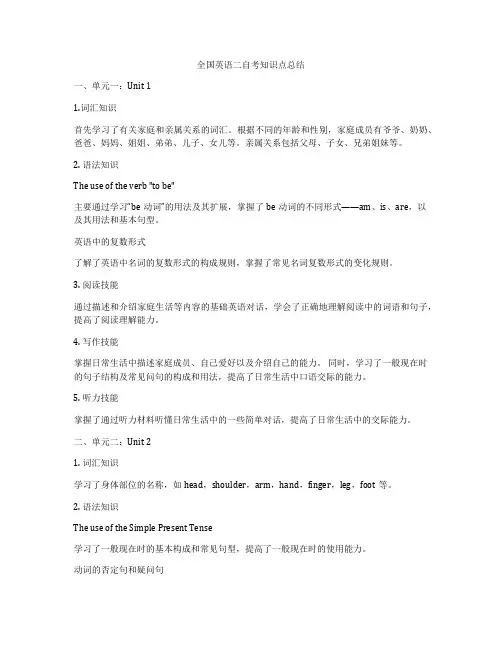
全国英语二自考知识点总结一、单元一:Unit 11.词汇知识首先学习了有关家庭和亲属关系的词汇。
根据不同的年龄和性别,家庭成员有爷爷、奶奶、爸爸、妈妈、姐姐、弟弟、儿子、女儿等。
亲属关系包括父母、子女、兄弟姐妹等。
2. 语法知识The use of the verb "to be"主要通过学习“be动词”的用法及其扩展,掌握了be动词的不同形式——am、is、are,以及其用法和基本句型。
英语中的复数形式了解了英语中名词的复数形式的构成规则,掌握了常见名词复数形式的变化规则。
3. 阅读技能通过描述和介绍家庭生活等内容的基础英语对话,学会了正确地理解阅读中的词语和句子,提高了阅读理解能力。
4. 写作技能掌握日常生活中描述家庭成员、自己爱好以及介绍自己的能力。
同时,学习了一般现在时的句子结构及常见问句的构成和用法,提高了日常生活中口语交际的能力。
5. 听力技能掌握了通过听力材料听懂日常生活中的一些简单对话,提高了日常生活中的交际能力。
二、单元二:Unit 21. 词汇知识学习了身体部位的名称,如head,shoulder,arm,hand,finger,leg,foot等。
2. 语法知识The use of the Simple Present Tense学习了一般现在时的基本构成和常见句型,提高了一般现在时的使用能力。
动词的否定句和疑问句掌握了动词的否定形式和疑问形式的基本构成和用法,提高了相关问句句型的灵活运用。
3. 阅读技能阅读理解内容主要涉及描述人体部位的基础知识,通过阅读加深了对这些知识的掌握和理解。
4. 写作技能学习了用英语如何正确描述自己的身体部位和健康状况,提高了描述自己和他人的能力,了解了一般现在时句型的使用。
5. 听力技能掌握了通过听力材料了解日常对话中关于身体部位和健康状况的内容,提高了日常交际和应对紧急情况的能力。
三、单元三:Unit 31. 词汇知识学习了有关学校生活的词汇,包括学校设施、课程安排、学习用品等。
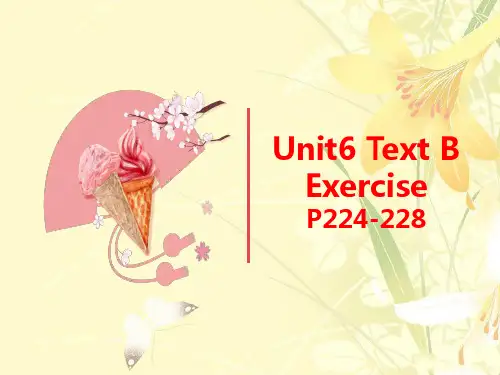
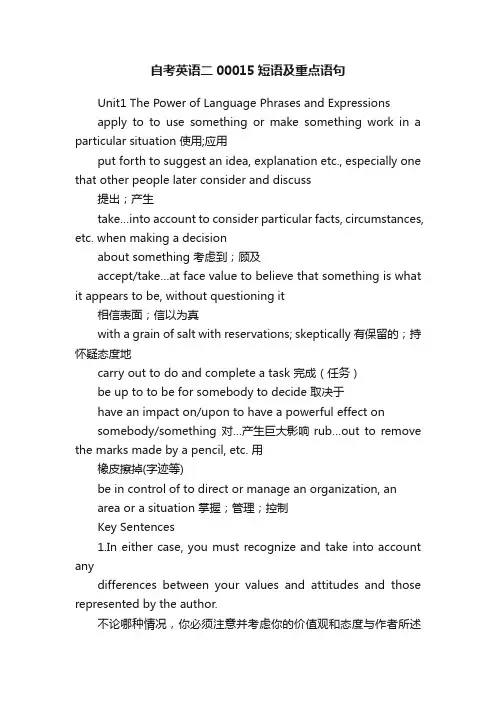
自考英语二00015短语及重点语句Unit1 The Power of Language Phrases and Expressionsapply to to use something or make something work in a particular situation 使用;应用put forth to suggest an idea, explanation etc., especially one that other people later consider and discuss提出;产生take…into account to consider particular facts, circumstances, etc. when making a decisionabout something 考虑到;顾及accept/take…at face value to believe that something is wha t it appears to be, without questioning it相信表面;信以为真with a grain of salt with reservations; skeptically 有保留的;持怀疑态度地carry out to do and complete a task 完成(任务)be up to to be for somebody to decide 取决于have an impact on/upon to have a powerful effect onsomebody/something 对…产生巨大影响rub…out to remove the marks made by a pencil, etc. 用橡皮擦掉(字迹等)be in control of to direct or manage an organization, anarea or a situation 掌握;管理;控制Key Sentences1.In either case, you must recognize and take into account anydifferences between your values and attitudes and those represented by the author.不论哪种情况,你必须注意并考虑你的价值观和态度与作者所述的价值观和态度有何不同。
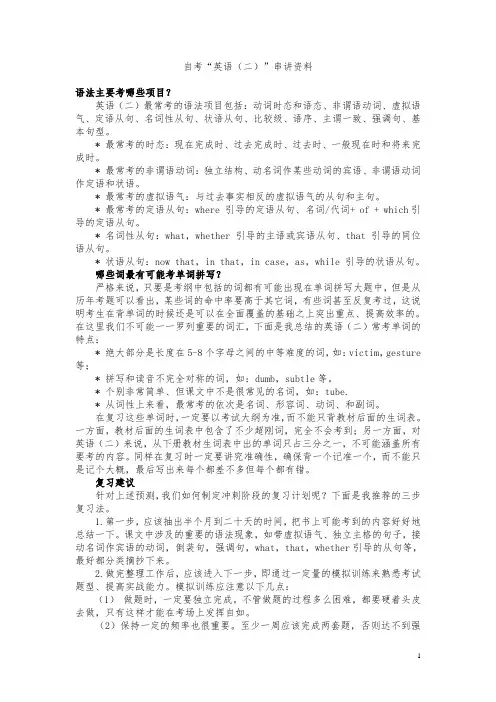
自考“英语(二)”串讲资料语法主要考哪些项目?英语(二)最常考的语法项目包括:动词时态和语态、非谓语动词、虚拟语气、定语从句、名词性从句、状语从句、比较级、语序、主谓一致、强调句、基本句型。
* 最常考的时态:现在完成时、过去完成时、过去时、一般现在时和将来完成时。
* 最常考的非谓语动词:独立结构、动名词作某些动词的宾语、非谓语动词作定语和状语。
* 最常考的虚拟语气:与过去事实相反的虚拟语气的从句和主句。
* 最常考的定语从句:where 引导的定语从句、名词/代词+ of + which引导的定语从句。
* 名词性从句:what,whether 引导的主语或宾语从句、that 引导的同位语从句。
* 状语从句:now that,in that,in case,as,while 引导的状语从句。
哪些词最有可能考单词拼写?严格来说,只要是考纲中包括的词都有可能出现在单词拼写大题中,但是从历年考题可以看出,某些词的命中率要高于其它词,有些词甚至反复考过,这说明考生在背单词的时候还是可以在全面覆盖的基础之上突出重点、提高效率的。
在这里我们不可能一一罗列重要的词汇,下面是我总结的英语(二)常考单词的特点:* 绝大部分是长度在5-8个字母之间的中等难度的词,如:victim,gesture 等;* 拼写和读音不完全对称的词,如:dumb,subtle等。
* 个别非常简单、但课文中不是很常见的名词,如:tube.* 从词性上来看,最常考的依次是名词、形容词、动词、和副词。
在复习这些单词时,一定要以考试大纲为准,而不能只背教材后面的生词表。
一方面,教材后面的生词表中包含了不少超刚词,完全不会考到;另一方面,对英语(二)来说,从下册教材生词表中出的单词只占三分之一,不可能涵盖所有要考的内容。
同样在复习时一定要讲究准确性,确保背一个记准一个,而不能只是记个大概,最后写出来每个都差不多但每个都有错。
复习建议针对上述预测,我们如何制定冲刺阶段的复习计划呢?下面是我推荐的三步复习法。
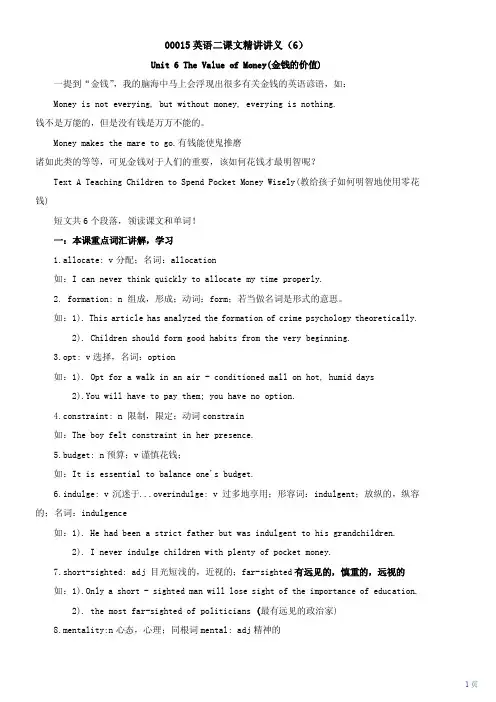
00015英语二课文精讲讲义(6)Unit 6 The Value of Money(金钱的价值)一提到“金钱”,我的脑海中马上会浮现出很多有关金钱的英语谚语,如:Money is not everying, but without money, everying is nothing.钱不是万能的,但是没有钱是万万不能的。
Money makes the mare to go.有钱能使鬼推磨诸如此类的等等,可见金钱对于人们的重要,该如何花钱才最明智呢?Text A Teaching Children to Spend Pocket Money Wisely(教给孩子如何明智地使用零花钱)短文共6个段落,领读课文和单词!一:本课重点词汇讲解,学习1.allocate: v分配;名词:allocation如:I can never think quickly to allocate my time properly.2. formation: n 组成,形成;动词:form;若当做名词是形式的意思。
如:1). This article has analyzed the formation of crime psychology theoretically.2).Children should form good habits from the very beginning.3.opt: v选择,名词:option如:1).Opt for a walk in an air - conditioned mall on hot, humid days2).You will have to pay them; you have no option.4.constraint: n 限制,限定;动词constrain如:The boy felt constraint in her presence.5.budget: n预算;v谨慎花钱;如:It is essential to balance one's budget.6.indulge: v沉迷于...overindulge: v 过多地享用;形容词:indulgent;放纵的,纵容的;名词:indulgence如:1). He had been a strict father but was indulgent to his grandchildren.2). I never indulge children with plenty of pocket money.7.short-sighted: adj 目光短浅的,近视的;far-sighted有远见的,慎重的,远视的如:1).Only a short - sighted man will lose sight of the importance of education.2). the most far-sighted of politicians (最有远见的政治家)8.mentality:n心态,心理;同根词mental: adj精神的如: He has many years' experience of the criminal mentality.(他研究犯罪心理有多年经验)9.rationing:n定量配给;ration v限量供应如:1). We have to ration the water.2).Food rationing was abolished in that country long ago.10.unnecessarily: adv没有必要地;同根词:necessary:adj; unnecessary: adj;如:1). It’s very foolish of the commander to expose his men to unnecessary risks.2). It is necessary for us to drink enough water every day.11.differentiate: v区分(相当于distinguish),同根词:different: adj; difference: n如:1). It’s improper to differentiate between pupils according to their family background.2).Children do not know by instinct the difference between right and wrong.12.resist: v抵挡,名词:resistance,一起学习 temptation: n 诱惑如:1). We anticipate that we will meet a certain amount of resistance to our plan.2). Most girls can’t resist the temptation of chocolates.二.课文重点短语,句子分析、讲解:1. Parents give pocket money to their children in different ways. Some give a lump sum at the beginning of a month or a week. Others prefer to give pocket money on a daily basis.译文:父母以不同的方式给孩子零花钱。
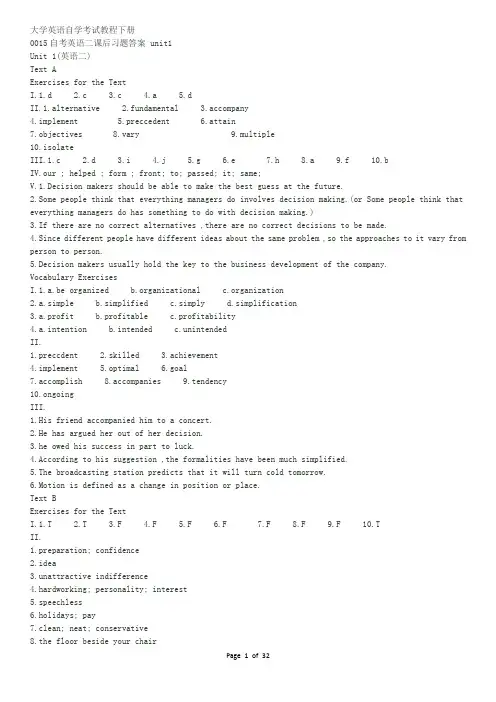
大学英语自学考试教程下册0015自考英语二课后习题答案 unit1Unit 1(英语二)Text AExercises for the TextI.1.d 2.c 3.c 4.a 5.dII.1.alternative 2.fundamental 3.accompany4.implement5.preccedent6.attain7.objectives 8.vary 9.multiple10.isolateIII.1.c 2.d 3.i 4.j 5.g 6.e 7.h 8.a 9.f 10.bIV.our ; helped ; form ; front; to; passed; it; same;V.1.Decision makers should be able to make the best guess at the future.2.Some people think that everything managers do involves decision making.(or Some people think that everything managers do has something to do with decision making.)3.If there are no correct alternatives ,there are no correct decisions to be made.4.Since different people have different ideas about the same problem ,so the approaches to it vary from person to person.5.Decision makers usually hold the key to the business development of the company.Vocabulary ExercisesI.1.a.be organized anizational anization2.a.simple b.simplified c.simply d.simplification3.a.profit b.profitable c.profitability4.a.intention b.intended c.unintendedII.1.preccdent2.skilled3.achievement4.implement5.optimal6.goal7.accomplish 8.accompanies 9.tendency10.ongoingIII.1.His friend accompanied him to a concert.2.He has argued her out of her decision.3.he owed his success in part to luck.4.According to his suggestion ,the formalities have been much simplified.5.The broadcasting station predicts that it will turn cold tomorrow.6.Motion is defined as a change in position or place.Text BExercises for the TextI.1.T 2.T 3.F 4.F 5.F 6.F 7.F 8.F 9.F 10.TII.1.preparation; confidence2.idea3.unattractive indifference4.hardworking; personality; interest5.speechless6.holidays; pay7.clean; neat; conservative8.the floor beside your chair9.politely; naturally10."I beg your pardon?" or "Could you please repeat it?" etc. Vocabulary ExercisesI.1.at a disadvantage2.conservative3.indifference4.make sure5.vague6.clutched7.turned down 8.to your advantage 9.neat10.prospects 11.take the trouble to 12.place Grammar ExercisesI.1.连词;让步状语从句。
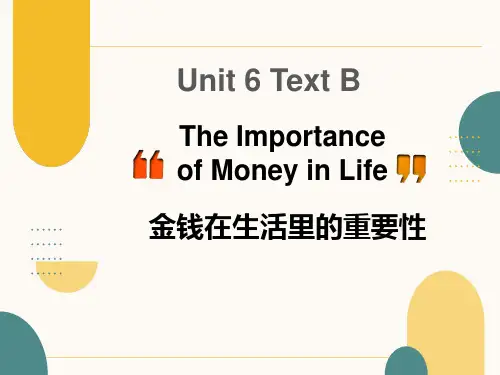


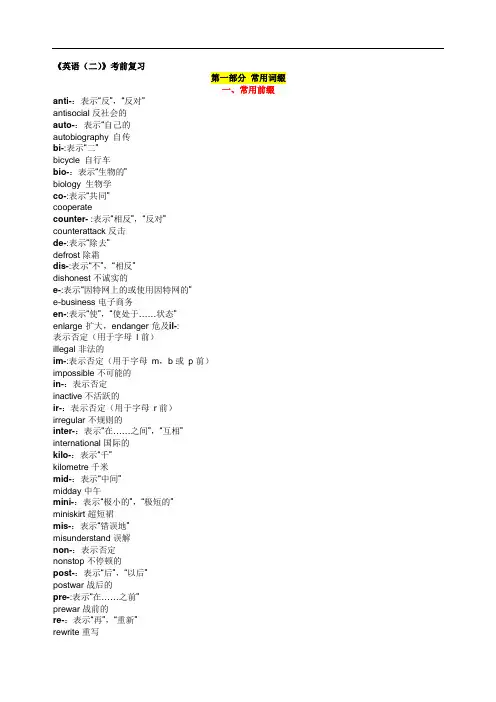
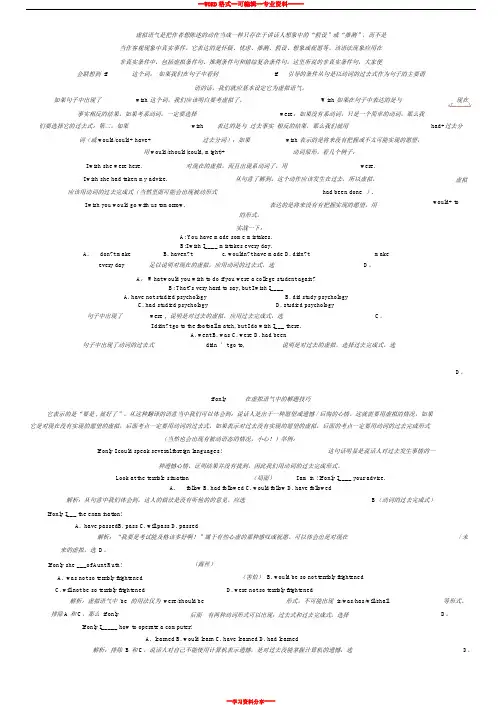
虚拟语气是把作者想陈述的动作当成一种只存在于讲话人想象中的“假设”或“推测”,而不是当作客观现象中真实事件。
它表达的是怀疑、忧虑、推测、假设、想象或祝愿等。
该语法现象应用在非真实条件中,包括虚拟条件句、推测条件句和错综复杂条件句。
这里所说的非真实条件句,大家便会联想到 if这个词,如果我们在句子中看到if引导的条件从句是以动词的过去式作为句子的主要谓语的话,我们就应基本设定它为虚拟语气。
如果句子中出现了wish 这个词,我们应该明白要考虚拟了。
Wish 如果在句子中表达的是与现在事实相反的结果,如果考系动词,一定要选择were;如果没有系动词,只是一个简单的动词,那么我们要选择它的过去式;第二,如果wish表达的是与过去事实相反的结果,那么我们就用had+过去分词(或 would/could+ have+过去分词);如果wish 表示的是将来没有把握或不太可能实现的愿望,用 would/should(could, might)+动词原形。
看几个例子:I wish she were here.对现在的虚拟,而且出现系动词了,用were.I wish she had taken my advice.从句意了解到,这个动作应该发生在过去,所以虚拟,应该用动词的过去完成式(当然里面可能会出现被动形式had been done ).I wish you would go with us tomorrow.表达的是将来没有有把握实现的愿望,用虚拟would+ to的形式。
实战一下:A: You have made some mistakes.B:I wish I____ mistakes every day.A. don?t makeB. haven?t c. wouldn?t have made D. didn?t makeevery day足以说明对现在的虚拟,应用动词的过去式,选D。
A: What would you wish to do if you were a college student again?B: That?s very hard to say, but I wish I____A. have not studied psychologyB. did study psychologyC. had studied psychologyD. studied psychology句子中出现了were , 说明是对过去的虚拟,应用过去完成式,选C。
00015英语二(自考)00015英语二重点语法(结合考题讲解)综合英语(二)常考的语法为:名词单数变复数,定语从句,虚拟语气,反意疑问句,非谓语动词,时态,名词性从句,形容词副词的比较级,主谓一致,倒装等等。
下面我们把这些语法项目进行详细的有重点的讲解。
名词1. 大多数集体名词可作单数,也可作复数,如:army ,audience ,class ,committee ,crew ( 全体船员,乘务员) ,crowd ,faculty ,family ,government ,group ,orchestra ,team ,union 等。
强调整体时谓语动词用单数,强调个体时谓语动词用复数。
如:The government is paying close attention to economic development.The government are having a heated discussion on this matter.2.有些名词形式为复数,却用作单数,如:electronics( 电子学) ,mathematics( 数学) ,optics( 光学) ,politics ,statistics( 统计学), economics (经济学), physics 等。
例如:Linguistics is a difficult subject to study.3. 名词作定语时,除了man和woman要和中心词一起变成复数之外,其它修饰词不能变成复数。
例如a woman teacher ---- two women teachersa man doctor ---- two men doctorsa girl student ---- five girl studentsa boy student ----six boy students4. 复合名词的复数只把其中所包含的主体名词变成复数。
自考00015英语二重点语法复习笔记1. 一般现在时(Simple Present Tense)1.1 定义与用法:一般现在时表示经常性、习惯性的动作或存在的状态。
常用时间状语有:always, usually, often, sometimes, every day/week/month/year, on weekends等。
1.2 谓语动词的构成:一般现在时的谓语动词构成:(1)一般动词:原形(2)第三人称单数(he/she/it):动词原形 + "s" / "es"(3)不可数名词或复数名词:动词原形1.3 示例:(1)I always go to bed early.(我总是早睡。
)(2)She watches TV every evening.(她每天晚上都看电视。
)(3)They eat breakfast at home.(他们在家吃早餐。
)2. 进行时态(Present Continuous Tense)2.1 定义与用法:进行时态表示现在正在进行的动作。
它一般用于表示现阶段的动作,常用时间状语有:now, at the moment, at present等。
2.2 谓语动词的构成:进行时态的谓语动词构成:be动词(am/is/are) + 现在分词(-ing形式)2.3 示例:(1)She is studying in the library now.(她现在正在图书馆学习。
)(2)We are watching a movie at the moment.(我们现在正在看电影。
)(3)He is eating dinner with his family.(他正在和家人一起吃晚饭。
)3. 一般过去时(Simple Past Tense)3.1 定义与用法:一般过去时表示过去某个时间发生的动作或存在的状态。
常用时间状语有:yesterday, last week/month/year, in 1999等。
自考英语(二)教材课后练习答案课程代码00015Unit 1 The power of languageText AChecking your comprehension1-5 BADACBuilding your vocabularySection A 1-6 consistent statement reflect invalid considerablycomparisonSection B 1-6 credible identify assumption represents evaluatedappropriateSection C 1-6 to forth into on with toBridging the gap1-10 defines action tears good express powerful internally shapes responds to personalTranslationSection A 1. take interests of different social groups into accountpare the recent work with the previous one3.was not consistent with his statement to the police4.was not relevant to the affair /matter that was being dealt with5.Please inform us of any change in your caseSection B成为一名灵活的读者,你需要知道怎样选择和使用阅读方式,来与你的阅读目的相一致。
懂得何时以及怎样选用不同的阅读方式会使你成为一个灵活的读者。
当读者的目的是需要很高的阅读理解能力来读懂难度很高的阅读材料时,精读是一名灵活的读者使用的阅读方法。
I. New words and expressions1A.New words1. critical adj. 有判断力的;判断公正(或审慎)的2. non-fiction n. 纪实文学3. position n. 观点;态度;立场4. statement n. 说明;说法;表态5. question v. 表示疑问;怀疑out of question / out of the question6. evaluate v. 估计;评价;评估7. context n. 事情发生的背景,环境,来龙去脉8. value n. values [pl.]是非标准;价值观valuableinvaluable=pricelessvalueless9. represent v. 描述;表现representative adj./n.10. assertion n. 明确肯定;断言11. sufficient adj. 足够的;充足的sufficiencyinsufficient12. statistic n. statistics [pl.]统计数字;统计资料13. integrate v.(使)合并,成为一体14. authority n.专家;学术权威;泰斗an/the authority on sth.authorize15. compare v. 比较;对比compare A with Bcompare A to B16. subject n. 主题;题目;题材17. consistent adj. 相符的;符合的18. inconsistency n. 不一致19. assumption n. 假定;假设20. case n. 具体情况;事例in casein case of firein case that…a case in pointconfirmed/suspected cases21. directly adv. 直接地;径直地22. identify v. 找到;发现23. valid adj. 符合逻辑的;合理的;确凿的validity n. 有效性,正确(性)invalid24. credible adj. 可信的;可靠的incredible=unbelievable25. landmark n.(标志重要阶段的)里程碑26. relevant adj. 紧密相关的;切题的relevancy n. 关联;恰当irrelevant27. current adj. 现时发生的;当前的28. appropriate adj. 合适的;恰当的inappropriateIt's (not) appropriate that ….29. bias n. 偏见;偏心;偏向30. considerably adv. 非常;很;相当多地considerconsideringconsiderableconsiderateconsideration31. Democrat n. (美国)民主党党员,民主党支持者民32. Republican n. (美国)共和党党员,共和党支持者33. reflect v. 显示;表明;表达34. informed adj. 有学问的;有见识的well-informedill-informedPhrases and Expressions1. apply to 使用;应用2. put forth 提出;产生3. take …into account 考虑到;顾及4. accept/take …at face value 相信表面;信以为真5. with a grain of salt 有保留地;持怀疑态度地I. New words and expressions1B.New words1. confidence n.自信心;把握相关词:confidentbe confident of sb. / sth.have / lose confidence in sb. / sth.注意比较:confident / confidential2. program v. 训练;培养3. mastery n. 控制;驾驭4. destiny n. 命运;天命;天数5. dramatically adv. 巨大地;惊人地;显著地6. quality n. 质量;品质7. subconscious adj. 下意识的;潛意识的8. please v. 使满意;使愉快9. command n.(给人或动物的)命令10. knowingly adv. 故意地;蓄意地11. impact n. 巨大影响;强大作用12. matter v. 事关紧要;有重大影响13. confident adj. 自信的;有自信心的14. sense n.(对重大事情的)感觉,意识15. eliminate v. 排除;清除;消除eliminate all grammatical mistakesbe eliminated in the first round16. disempower v. 剥夺;使失去权利;剥夺力量注意构词法:dis(表示否定)+em(使,赋予)+poweren- / em-常见的动词前缀,如:enable, enrich, endanger, enlarge等。
00015英语二课文精讲讲义(6)00015英语二课文精讲讲义(6)Unit 6 The Value of Money(金钱的价值)一提到“金钱”,我的脑海中马上会浮现出很多有关金钱的英语谚语,如:Money is not everying, but without money, everying is nothing.钱不是万能的,但是没有钱是万万不能的。
Money makes the mare to go.有钱能使鬼推磨诸如此类的等等,可见金钱对于人们的重要,该如何花钱才最明智呢?Text A Teaching Children to Spend Pocket Money Wisely(教给孩子如何明智地使用零花钱)短文共6个段落,领读课文和单词!一:本课重点词汇讲解,学习1.allocate: v分配;名词:allocation如:I can never think quickly to allocate my time properly.2. formation: n 组成,形成;动词:form;若当做名词是形式的意思。
如:1). This article has analyzed the formation of crime psychology theoretically.2).Children should form good habits from the very beginning.3.opt: v选择,名词:option如:1).Opt for a walk in an air - conditioned mall on hot, humid days2).You will have to pay them; you have no option.4.constraint: n 限制,限定;动词constrain如:The boy felt constraint in her presence.5.budget: n预算;v谨慎花钱;如:It is essential to balance one's budget.6.indulge: v沉迷于...overindulge: v 过多地享用;形容词:indulgent;放纵的,纵容的;名词:indulgence如:1). He had been a strict father but was indulgent to his grandchildren.2). I never indulge children with plenty of pocket money.7.short-sighted: adj 目光短浅的,近视的;far-sighted有远见的,慎重的,远视的如:1).Only a short - sighted man will lose sight of the importance of education.2). the most far-sighted of politicians (最有远见的政治家)8.mentality:n心态,心理;同根词mental: adj精神的如: He has many years' experience of the criminal mentality.(他研究犯罪心理有多年经验)9.rationing:n定量配给;ration v限量供应如:1). We have to ration the water.2).Food rationing was abolished in that country long ago.10.unnecessarily: adv没有必要地;同根词:necessary:adj; unnecessary: adj;如:1). It’s very foolish of the commander to expose his men to unnecessary risks.2). It is necessary for us to drink enough water every day.11.differentiate: v区分(相当于distinguish),同根词:different: adj; difference: n如:1). It’s improper to differentiate between pupils according to their family background.2).Children do not know by instinct the difference between right and wrong.12.resist: v抵挡,名词:resistance,一起学习 temptation: n 诱惑如:1). We anticipate that we will meet a certain amount of resistance to our plan.2). Most girls can’t resist the temptation of chocolates.二.课文重点短语,句子分析、讲解:1. Parents give pocket money to their children in different ways. Some give a lump sum at the beginning of a month or a week. Others prefer to give pocket money on a daily basis.译文:父母以不同的方式给孩子零花钱。